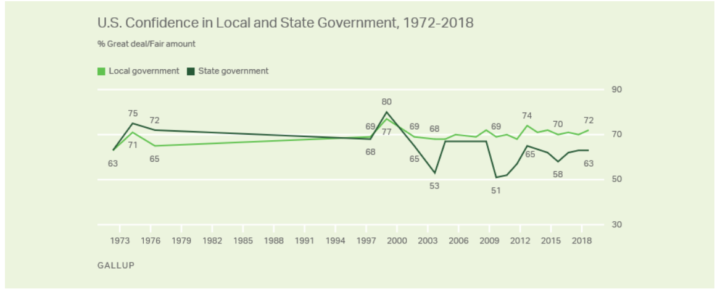
Civilytics tagline is: “Measuring the pulse of civic life.” Measurements, whether in health care or care of a democracy, only tell part of the picture, but when chosen well, they can tell that part of the picture very efficiently. The pulse is a simple, but vital, measure that conveys a lot of information while remaining easy to understand and measure. Ongoing monitoring of a patient is done by keeping track of a patient’s pulse and a number of other indicators that provide immediate interpretation and lots of information.
In this post I’m going to explain why local government matters more than ever, and why it is critical we take its pulse.
The Enduring Strength of and Faith in Local Government
Trust and faith in the problem solving capacity of the federal government ebbs and flows. This Gallup poll highlights the new low that faith in government has reached.
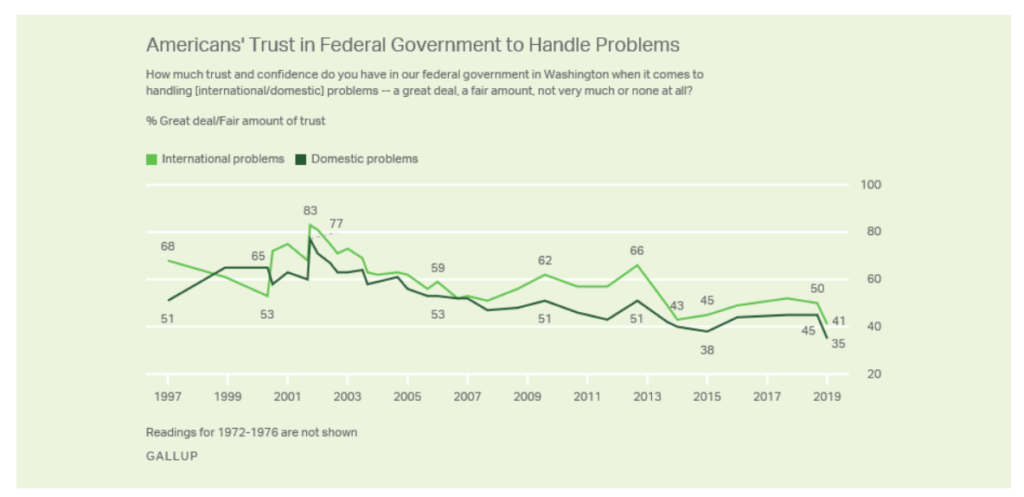
Faith in the federal government to solve domestic problems is at an all time low. While this is concerning, it is also true that Americans’ faith in the federal government to solve their problems has always been highly dependent on which political party they belong to and which party is in control. Look at this trend when we divide it by party-affiliation:
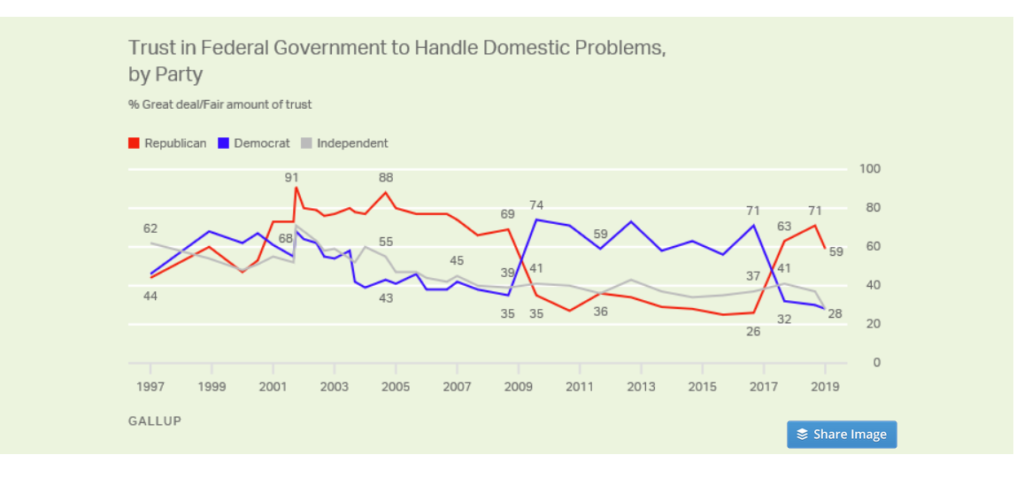
Contrast this roller coaster trend of public faith in the federal government, tied closely with political party, with the steady high regard Americans hold for their state and local governments – according to Gallup polling.
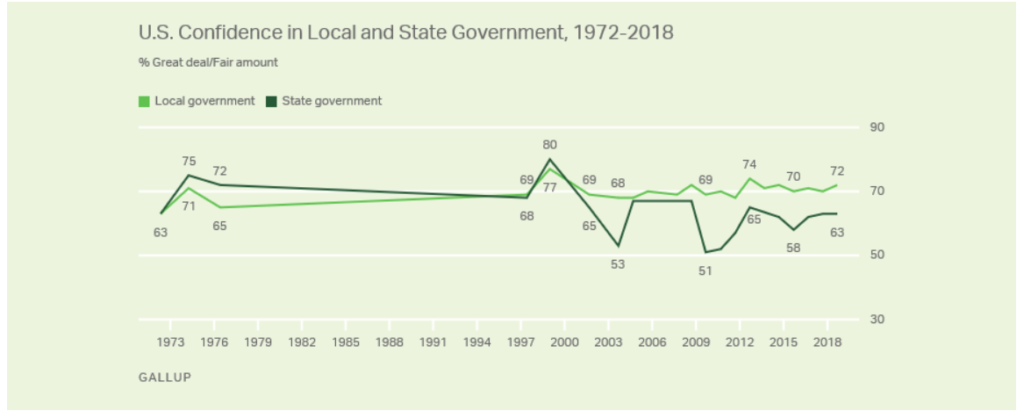
Even when we look at local government approval by party affiliation, we see greater trust and greater stability over time.
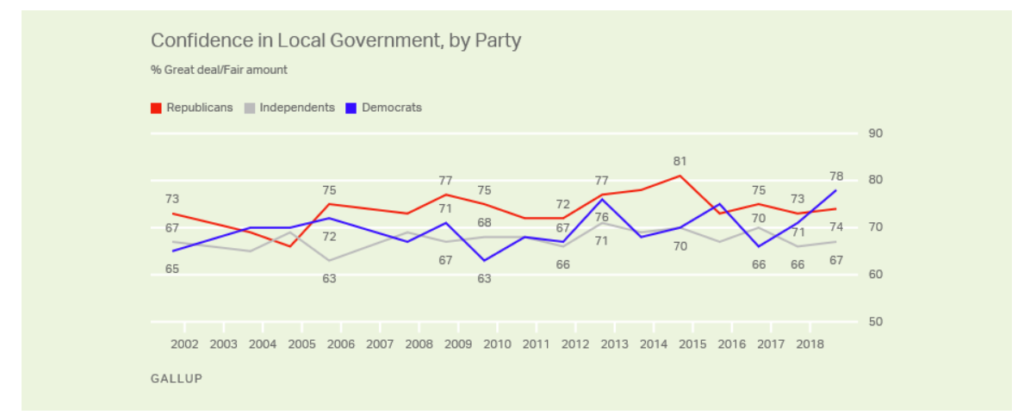
The American public consistently believes local government can solve problems that matter to them. In my dissertation one thing I evaluated was how democratic local governments are. I concluded that many local governments in America retain what I call “democratic promise.” Democratic promise means that formal and structural barriers to political participation are low. Contrast running for local and federal office. Running for federal office, like the U.S. House or Senate, requires winning a partisan primary, fundraising hundreds of thousands of dollars (or more), and building a small enterprise of professional campaign staff and volunteers. In all but the largest cities, running for city council can be done alongside a full-time job, with minimal fundraising, and with entirely amateur campaign staff.
Despite these lowered barriers to entry, acting on the democratic promise of local government, remains low. This is because of informal barriers to participation are high – acquiring the information necessary to make local political decisions is expensive and time-consuming, and the infrastructure to make this information usable and accessible remains rudimentary1.
This is where taking the pulse comes in.
The Importance of Information in Democratic Control
Acquiring information needed to petition your government for change can be daunting. Citizens who experience an unsafe environment, unclean drinking water, or lack of safe access to a public park may feel deterred from speaking up due to a lack of information that they perceive is necessary to make a credible case. Often, it can be frustrating to look at local conditions and wonder how “normal” such conditions are in other communities like your own. Such information about what is “normal” or happening elsewhere is important in order to be taken seriously and ultimately to be effective in your activism.
This need for information becomes a cause for concern when the definition of what is acceptable information in public deliberation about local policy changes. Today, a massive shift has occurred away from narrative experiences of residents toward tabulated counts of events and people (Eubanks 2017).
The Technocratic Threat to Responsive Governance
As we’ve asked government to take on increasingly complex challenges, and to do so with increasingly constrained resources, government has turned to professionals for expertise and advice. This rise of expertise, technocracy, has produced a more efficient and professionalized government with many innovations and improvements to service delivery. But it has also increasingly asked the public to trust the array of unelected professionals designing, implementing, advising, and strategizing about local services. I have already said much on this topic, but it is important here too. With experts measuring, evaluating, and analyzing all aspects of government performance it can become all too easy for the government to say to the public “trust us” or, if you don’t, “bring data to back up your point.”
This poses three major problems:
- The government we are trying to hold accountable is the source of that data.
- Accessing and preparing data as evidence in an argument is a specialized skill – leaving some left out of the conversation.
- It excludes many other ways of knowing from being treated as valid evidence. Stories, case studies, investigations, and many many other forms of evidence are pushed aside (Stone 2002).
To address this, we need to rethink the role of measurement and data in how we hold government accountable.
The Risks of Local Government
The informal barriers to accessing local government create another problem – the ability of a small group of people to seize control and attempt to insulate their community from the larger community. In its worst form this allows small communities to adopt racist or other radical agendas enforced through informal networks. In other forms it allows for a small segment of the community, perhaps not even residents in the case of cities like Hartford, CT, to decide on how the schools, police, and public parks are run without having a personal stake in those services.2
It is an American tradition since before Thomas Jefferson to romanticize the potential of local government, but local government has also sheltered and enabled some of the most ghastly incidents of racial and class violence in our nation’s history. This is why simply introducing technocratic solutions to make local government “run better” are not enough – to avoid repeating the mistakes of the past or empowering local government to simply do more of what it is doing – we have to ensure local government operates democratically.
Why Local Government Accountability Matters Now
If local government is the most responsive form of government available to us, and the one we trust most to solve problems that matter to our everyday lives, we need to act now to ensure it stays that way. The slide into a technocratic government run by professionals, at the exclusion of the voice of the citizens, is a clear and present danger to our democracy. Not because of twirling mustaches or backroom deals, but because of the risk that the pursuit of complete professionalization leaves no room for the voice of the affected, the lived experience of the public.
One bulwark we can turn to is accountability measures. Open data and open metrics that are comparative and informative, and, like a pulse, provide a steady assessment of how the community is doing.
References
Eubanks, Virginia. 2017. Automating Inequality: How High-Tech Tools Profile, Police, and Punish the Poor. First Edition. New York, NY: St. Martin’s Press.
Stone, Deborah A. 2002. Policy Paradox: The Art of Political Decision Making. Rev. ed. New York: Norton.
- Political parties, for good or bad, play this role at other levels of government. The lack of party involvement in local government often removes formal barriers but increases informal barriers.
- I’m indebted to my friend Se-Hyoung Yi for his review and feedback on this article and for reminding me to highlight the drawbacks and risks associated with local control.


